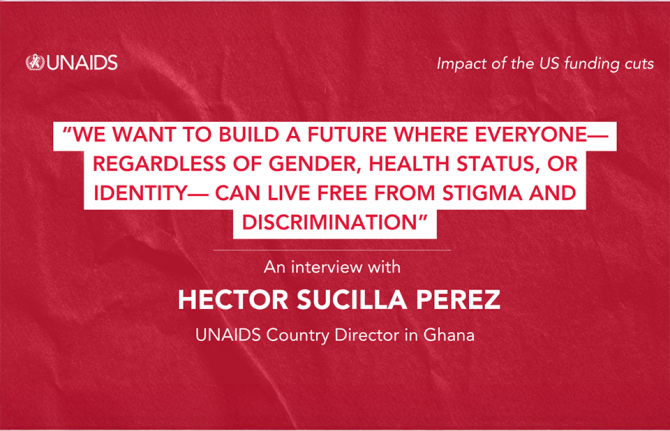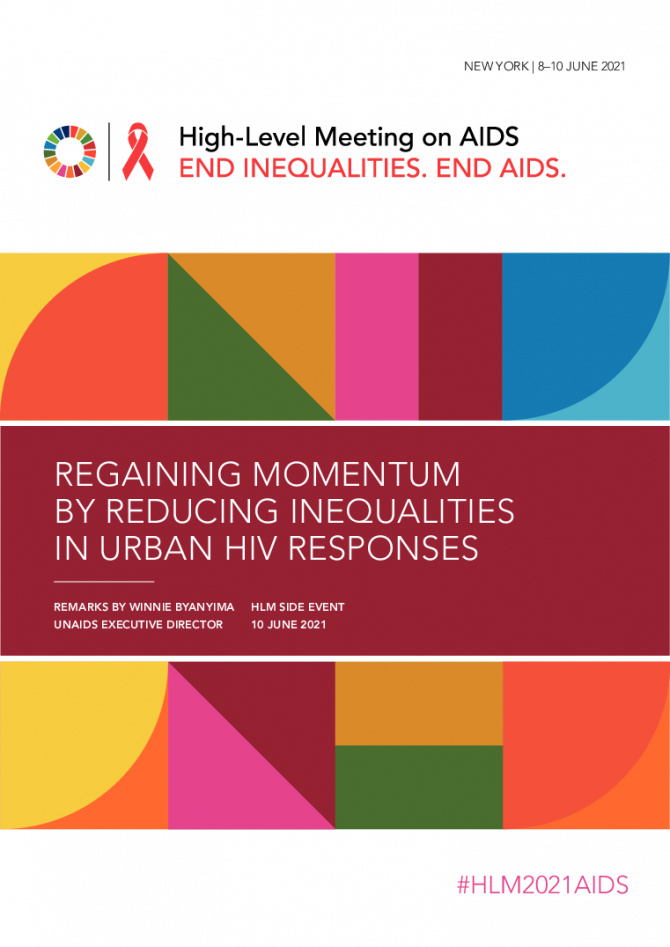
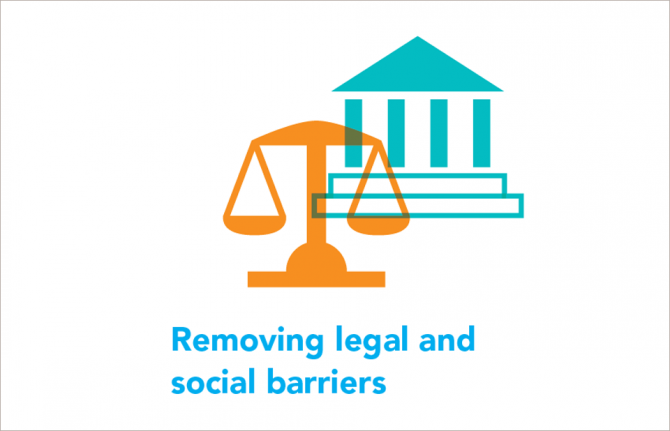
Feature Story
UNAIDS strongly supports calls for the rejection of draft law targeting LGBTI people in Ghana
12 August 2021
12 August 2021 12 August 2021UNAIDS fully backs calls made today by an eminent group of United Nations experts that Ghana should reject a proposed “family values bill” that targets the country’s lesbian, gay, bisexual, transgender and intersex community.
After analyzing the draft legislation, the independent experts appointed by the United Nations Human Rights Council concluded that adopting the legislation in its current or any partial form would be tantamount to a violation of a number of human rights standards, including the absolute prohibition of torture.
The experts said that the proposed law seeks to establish a system of State-sponsored discrimination and violence against the LGBTI community.
UNAIDS has already called for the law to be rejected as a gross violation of human rights. It has also warned that the legislation would be a grave setback for the HIV response in driving vulnerable people further away from essential HIV treatment, care and prevention services.
Ghana: Anti-LGBTI draft bill a “recipe for violence” – UN experts
GENEVA, 12 August 2021 — UN human rights experts* urged Ghana’s Government to reject a proposed ‘family values’ bill, saying it seeks to establish a system of State-sponsored discrimination and violence against the LGBTI community. The first reading of the bill took place on 2 August 2021, and its consideration is expected to resume in October 2021.
“The draft legislation argues that any person who deviates from an arbitrary standard of sexual orientation or gender identity is immediately to be considered dangerous, sick or anti-social,” said the experts. “Such laws are a textbook example of discrimination.
“The proposed law promotes deeply harmful practices that amount to ill-treatment and are conducive to torture, such as so-called ‘conversion therapy’ and other heinous violations like unecessary medical procedures on intersex children, and so-called corrective rape for women,” they added.
The independent experts, appointed by the Human Rights Council, presented an analysis of the draft bill to the Ghanaian Government, concluding that adopting the legislation in its current or any partial form would be tantamount to a violation of a number of human rights standards, including the absolute prohibition of torture.
For example, attempts to prevent human rights defenders from organising themselves to defend LGBTI people, and the absolute prohibition of public debate on sexual orientation and gender identity, raises grave concerns about rights to freedom of opinion and expression, and of association. Moreover, the bill in question would essentially legitimize the above instances of violence against LBTI women and reinforce existing gender stereotypes and discrimination against women, which are both cause and consequence of violence against women and girls.
“The consideration of this legislation is deeply perplexing in a country that has been regarded as a champion of democracy in Africa, with an impressive record of achieving certain Millennium Development Goals by 2015,” they said. They cited specific concerns about the MDG goals on health, education, employment, housing and gender justice.
“The draft legislation appears to be the result of a deep loathing toward the LGBTI community. It will not only criminalise LGBTI people, but anyone who supports their human rights, shows sympathy to them or is even remotely associated with them.
“Given that LGBTI people are present in every family and every community it is not very difficult to imagine how, if it were to be adopted, this legislation could create a recipe for conflict and violence.”
ENDS
*The experts: Victor Madrigal-Borloz, Independent Expert on protection against violence and discrimination based on sexual orientation and gender identity; Reem Alsalem, Special Rapporteur on violence against women, its causes and consequences; Koumbou Boly Barry, Special Rapporteur on the right to education; Irene Khan; Special Rapporteur on the promotion and protection of the right to freedom of expression; Mary Lawlor, Special Rapporteur on the situation of human rights defenders; Nils Melzer, Special Rapporteur on Torture and other Cruel, Inhuman or Degrading Treatment or Punishment; Tlaleng Mofokeng, Special Rapporteur on the right of everyone to the enjoyment of the highest attainable standard of physical and mental health; Elina Steinerte (Chair-Rapporteur), Miriam Estrada-Castillo (Vice-chairperson), Leigh Toomey, Mumba Malila, Priya Gopalan, Working Group on arbitrary detention Clément Nyaletsossi Voule, Special Rapporteur on Rights to Freedom of Peaceful Assembly and Association
The Special Rapporteurs, Independent Experts and Working Groups are part of what is known as the Special Procedures of the Human Rights Council. Special Procedures, the largest body of independent experts in the UN Human Rights system, is the general name of the Council's independent fact-finding and monitoring mechanisms that address either specific country situations or thematic issues in all parts of the world. Special Procedures' experts work on a voluntary basis; they are not UN staff and do not receive a salary for their work. They are independent from any government or organization and serve in their individual capacity.
UN Human Rights, country page: Ghana
For more information and media requests please contact Catherine de Preux De Baets (+41 22 917 93 27/ cdepreuxdebaets@ohchr.org) or write to ie-sogi@ohchr.org
For media enquiries regarding other UN independent experts, please contact Renato de Souza (+41 22 928 9855 / rrosariodesouza@ohchr.org).
Follow news related to the UN's independent human rights experts on Twitter @UN_SPExperts.
Our work
Region/country
Related


Feature Story
City leaders unite to regain momentum in the urban HIV response
11 June 2021
11 June 2021 11 June 2021Mayors from four cities, together with a representative of civil society and the core partners of the Fast-Track cities initiative—UNAIDS, the International Association of Providers of AIDS Care (IAPAC), the United Nations Human Settlements Programme (UN-Habitat) and the city of Paris—participated in a virtual side event on urban settings on 10 June, held during the United Nations High-Level Meeting on AIDS.
The participants reflected on the progress made in urban HIV responses and disruptions related to COVID-19, the importance of sustained political leadership and commitment during public health crises and the critical role of communities in strengthening HIV and other health services.
“A Fast-Track city is a city embracing human rights and advocating for more equality and freedom. The freedom to be true to yourself, to live where you want, to live free of prejudice, and with equal chance to stay healthy,” said the Mayor of Paris, Anne Hidalgo, in her opening address.
In her message, Maimunah Mohd Sharif, the Executive Director of UN‐Habitat, highlighted that, “Reducing inequalities is central to both UN-Habitat’s mission broadly and to ending urban HIV epidemics given the unacceptable disparities we see with respect to HIV among sexual and ethnic minorities, including the LGBTQ+ populations, migrants and refugees, and other marginalized populations, such as those in slums and informal settlements.”
Sibongile Tshabalala, the national Chairperson of the Treatment Action Campaign in South Africa, emphasized the importance of community leadership if we want to end AIDS, and called for communities to be at the centre of the HIV response within the context of ending social marginalization and health inequalities.
Attending mayors from Baton Rouge, Johannesburg, Kyiv and Quezon City presented their experiences in exercising public health leadership in HIV responses at the city level and in mitigating the impact of the COVID-19 pandemic. Many cities have made significant progress in accelerating their urban HIV responses since the beginning of the Fast-Track cities initiative on World AIDS Day 2014. In Kyiv, for example, according to national data the percentage of people who know their HIV status and are on antiretroviral therapy rose from less than 50% in 2015 to 83% in 2019, with 95% of those being virally suppressed. In Paris, according to national data the number of new HIV infections dropped by 16% between 2015 and 2018. And in Johannesburg, a targeted testing approach during the COVID-19 pandemic led to an increase in the percentage of people living with HIV knowing their status, from 86% in March 2020 to 91% in 2021, according to national data.
Maria Josefina Belmonte, the Mayor of Quezon City, called on mayors to use the “Power and resources at their disposal towards the common good, including eradicating HIV and addressing issues that others are afraid to address because they are controversial or they may not be acceptable or not be politically sound.” She added that, “It is every person’s right to live freely, humanely and justly in the world they were born in and it is our duty as mayors elected by the people to make that happen for them.”
The moderator of the event, IAPAC President/Chief Executive Officer José M. Zuniga, recognized the progress made by Fast-Track cities, even within the context of the COVID-19 pandemic. “City public health leadership is translating into countless lives saved and enhanced, including as Fast-Track cities grapple with an emerging COVID-19 pandemic and simultaneously work to maintain a continuity of HIV and other essential health services for all of their citizens,” he said.
In many cities, the 90–90–90 targets for 2020 were not achieved, partly because of COVID-19-related disruptions, but also due to persistent inequalities and social exclusion. A prioritization of social enablers is therefore required to regain momentum against HIV across the Fast-Track cities network.
In her closing statement, Winnie Byanyima, the UNAIDS Executive Director, called on cities and municipalities around the world to recommit to accelerated urban HIV responses, to exercise public health leadership to achieve the 2025 targets, to end inequalities and social exclusion and to end AIDS as a public health threat by 2030.
Related

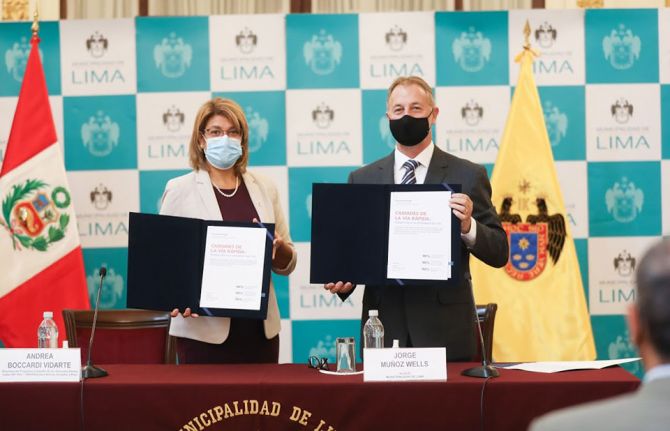
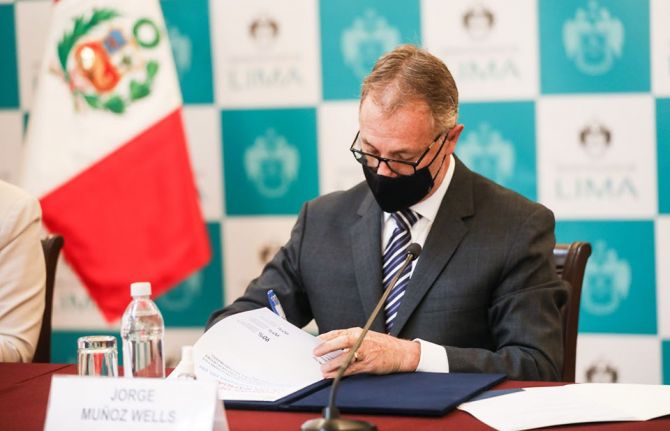
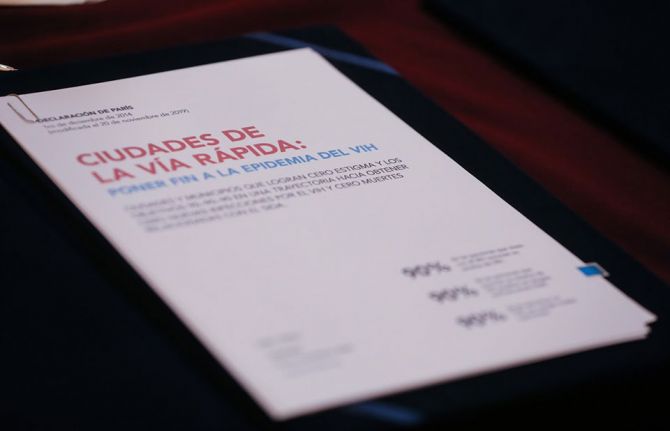
Feature Story
Lima joins the Fast-Track cities initiative
18 December 2020
18 December 2020 18 December 2020When Lima celebrated this year’s World AIDS Day, the Mayor, Jorge Muñoz, decided to go beyond the traditional lighting of buildings and participation in official events to mark the day. By signing the Paris Declaration to end the AIDS epidemic in cities, he joined the Fast-Track cities initiative, a network of more than 300 municipalities around the world, 70 of which are in Latin America and the Caribbean, and committed to ending the AIDS epidemic as a public health threat by 2030.
Lima has a population of more than 10 million people and accounts for around one third of the national population. Lima and the two other Peruvian municipalities that have already signed the Paris Declaration, Callao and La Victoria, accounted for around 50% of all new HIV infections in the country in 2019.
“Through this public commitment, the city of Lima pledges to carry out the necessary actions to accelerate the response to AIDS, including education, awareness-raising and non-discrimination campaigns,” said Mr Muñoz during the signing ceremony. “We will also implement a work plan to train health personnel and promote access to information and sex education.”
“With the signature of the Paris Declaration, the city has committed to eliminate stigma and discrimination against people living with HIV and key populations, scale up HIV prevention services and contribute to achieving national targets to end AIDS as a public health threat by 2030 as part of the Sustainable Development Goals,” said Andrea Boccardi, the UNAIDS Country Director and Representative for Peru, Ecuador and the Plurinational State of Bolivia.
This is not the first time that Mr Muñoz has taken action against discrimination. In May 2019, when he was the Mayor of the city of Miraflores, he established an ordinance that prohibited discrimination in all its forms in the public and private spheres of the district. Now, as the Mayor of Lima, he has extended that policy to the entire province.
On 1 December 2014, mayors from around the world met in Paris to launch the Fast-Track cities initiative and pledged to adopt a series of commitments to accelerate their response to HIV, with the aim of ending the AIDS epidemic by 2030. Besides committing to ending the AIDS epidemic at the municipal level and uniting as leaders, the signatories also commit to putting people at the centre, addressing the causes of risk, vulnerability and transmission of HIV, using the AIDS response for positive social transformation, building and accelerating appropriate responses reflecting local needs, and mobilizing resources for integrated public health and sustainable development.
Our work
Region/country
Documents
Cities on the road to success — Good practices in the Fast-Track cities initiative to end AIDS
04 December 2019
This report describes the efforts of the many partners in the Fast-Track cities initiative to accelerate the AIDS response and deliver on the goals of the Paris Declaration. Urban leaders have shown commitment and political will, and cities across the globe have developed strategic action plans with ambitious targets and bold implementation strategies. New partnerships have been forged between local authorities, civil society organizations, implementers and researchers, and these have contributed to expanded access to quality HIV services.

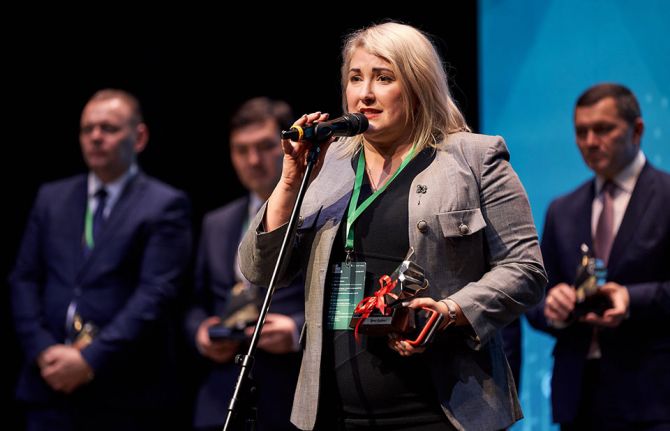
Feature Story
Turning around the HIV response in Odesa
24 November 2020
24 November 2020 24 November 2020Irina Kutsenko, a deputy of the Odesa City Council in Ukraine responsible for social issues, is an active advocate of community rights who campaigned for medical and social services for HIV to be brought closer to the most disadvantaged. She is the first and so far the only government official nominated by civil society for the #inYourPower award. The award, which is given by civil society to leaders, government officials and eastern European and central Asian politicians, is given to people who have contributed to improving the financial sustainability and effectiveness of HIV programmes for key populations and to removing legal barriers to HIV services and protecting human rights.
However, the route to the award was not straightforward. “As a deputy, I closed the opioid substitution therapy site in my district. I collected signatures from people against the gay movement in our city,” she said. But after completing a course run by the International Academy of Harm Reduction, she began to research the topic in more detail. “I started reading about the issue on the Internet, listening to interviews of people, listening to life stories, until I understood that I was wrong!”
Ms Kutsenko started to cooperate with community organizations to make Odesa a safer city for key populations.
“When representatives of community organizations came to me with a harm reduction project in the city, I already understood what they were talking about. At that moment, I realized that nongovernmental organizations today know more than officials. At the beginning, I was only listening,” she said.
The first task for Ms Kutsenko and the community organizations was to find a common language and common platform. “We needed everyone: doctors, the authorities and public organizations to unite and work towards one common goal,” she said. “It didn't work out when everyone was separate.”
But, as Gennadiy Trukhanov, the Mayor of Odesa, said, it was not easy for the city. The city authorities, in addition to responding to local everyday problems also need to address global challenges, in particular helping health-care workers to fight the COVID-19 pandemic. “Mayors are assessed by the state of the city: roads, public spaces, etc. We can have clean cities, but with the spread of infectious diseases around the world, the time may come when there will be no one to walk along these roads,” he said.
Over the past few years, Odesa has been implementing steps within the framework of the Paris Declaration to end the AIDS epidemic in cities and was the first city in Ukraine to commit to the Zero TB Cities initiative. The city has initiated outpatient treatment of tuberculosis, instead of in hospital, and has begun widescale testing programmes for HIV, increasing the detection rate of HIV and ensuring that people who test positive access treatment.
“Of course, there are still many problems, but, step by step, we are changing the situation in the city,” said Ms Kutsenko.
Ms Kutsenko’s story can be viewed on YouTube.
Related

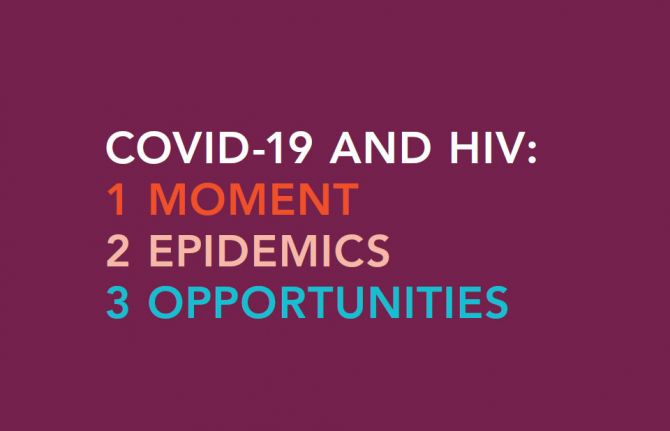
Press Release
HIV and COVID-19: a unique moment in time to learn, leverage and build resilient systems for health
09 September 2020 09 September 2020On the opening day of the Virtual Fast-Track Cities 2020 conference on urban HIV and COVID-19 responses, UNAIDS has released a new report on how to strengthen responses to health emergencies
GENEVA, 9 September 2020—A new report from UNAIDS shows how countries grappling with COVID-19 are using the experience and infrastructure from the AIDS response to ensure a more robust response to both pandemics. COVID-19 and HIV: 1 moment, 2 epidemics, 3 opportunities—how to seize the moment to learn, leverage and build a new way forward for everyone’s health and rights shows that by identifying the dynamic changes needed, systems can be found that are effective, inclusive, equitable and sufficiently resourced.
“Given the epic dimensions of the emergency, the world needs unity and solidarity,” said United Nations Secretary-General António Guterres. “Our decades-long fight against HIV offers essential lessons. By heeding those lessons and working together, we can ensure that national health responses deliver on the promise of the 2030 Agenda for Sustainable Development and the health and well-being of all.”
The three opportunities highlighted in the report are: (1) that key lessons learned from the HIV response should inform COVID-19 responses; (2) how the HIV infrastructure is already driving COVID-19 responses and has the potential to catalyse accelerated progress; and (3) how the COVID-19 and HIV responses offer a historic opportunity to build a bridge to adaptable, results-driven systems for health that work for people.
“This is a unique opportunity to reimagine systems for health,” said Winnie Byanyima, Executive Director of UNAIDS. “All eyes are on health, health systems and health care, with countries wanting to be better equipped to deal not only with COVID-19 but also to create healthier, more resilient societies. We can seize this opportunity by learning from HIV and from COVID-19 to make important changes to develop rights-based, equitable, people-centred systems for health.”
The report highlights how the HIV response can help to jump-start an accelerated response to COVID-19 in ways that can help to ensure that such efforts do not come at the expense of the HIV response or other essential health priorities. At the same time that the world undertakes focused efforts to slow the spread of COVID-19, it must also redouble efforts to limit any interruption and promote rapid recovery of HIV-related services, including ensuring uninterrupted supplies of essential commodities and technologies for HIV and other global health priorities.
“COVID-19 has caused significant loss of life in many communities, but notably in those where inequities make people more vulnerable to ill health. Leveraging of the HIV infrastructure and workforce has helped to mitigate what might have been a far worse situation,” said José M. Zuniga, President/Chief Executive Officer of the International Association of Providers of AIDS Care and co-organizer of the Virtual Fast-Track Cities 2020 event with UNAIDS. “However, with current HIV spending substantially off-track, the world urgently needs to increase investments in the responses to both HIV and COVID-19 and not siphon off one to respond to the other.”
The extensive, dynamic and agile infrastructure that has been built up around the HIV response is being leveraged in many ways to assist the response to COVID-19 and includes innovative, community-led service delivery. For example, 280 000 new health-care workers trained by the United States President’s Emergency Plan for AIDS Relief are currently assisting as first responders to COVID-19 in many low- and middle-income countries. In addition, 17 HIV treatment reference centres in Morocco are now functioning as the first line for COVID-19 treatment services. The HIV nongovernmental organization Housing Works in New York City opened two shelters specifically for homeless people who have tested positive for COVID-19.
The report highlights that although different in many respects, COVID-19 and HIV share important characteristics and that by incorporating key lessons learned from HIV, the response to COVID-19 can avoid many errors. One essential element is the buy-in and leadership of communities. Community activism has sped up the delivery of life-saving HIV medicines, community surveillance has alerted officials to dangerous medicine stock-outs and communities have delivered essential door-to-door HIV testing and treatment services and are leading efforts to strike down punitive laws that drive populations such as gay men and other men who have sex with men, sex workers and people who use drugs away from critical health services.
The report also shows the importance of firmly grounding health responses in human rights and the need for gender-transformative responses. Other actions include strengthening strategic information systems capable of delivering timely, accurate data on the pandemic to identify new outbreaks and global coordination, sustained political will and a multisectoral response.
“The emergence of COVID-19 has exposed the underlying weaknesses in health systems, which have proved to be under-resourced, unprepared and unsustainable,” said Ms Byanyima. “UNAIDS is urging that systems for health be reimagined to ensure that they are inclusive, just and equitable.”
Systems for health in the future must be prepared to address any new major health crisis by being agile, results-driven, inclusive and people-centred. COVID-19 and the response to HIV should be used as an opportunity to reimagine systems for health that work for people, maximize efficiency and effectiveness, attract sufficient resources and engage communities as essential partners for health.
The Virtual Fast-Track Cities 2020 conference is taking place on 9 and 10 September, bringing together around 1500 representatives of more than 300 cities and municipalities around the world to discuss urban responses to COVID-19 and HIV. Anthony Fauci, Director of the United States National Institute of Allergy and Infectious Diseases, will give the keynote speech and UNAIDS will be presenting on the importance of the continuity of HIV services during COVID-19 and discussing mitigation strategies to protect gains made in the response to HIV.
UNAIDS
The Joint United Nations Programme on HIV/AIDS (UNAIDS) leads and inspires the world to achieve its shared vision of zero new HIV infections, zero discrimination and zero AIDS-related deaths. UNAIDS unites the efforts of 11 UN organizations—UNHCR, UNICEF, WFP, UNDP, UNFPA, UNODC, UN Women, ILO, UNESCO, WHO and the World Bank—and works closely with global and national partners towards ending the AIDS epidemic by 2030 as part of the Sustainable Development Goals. Learn more at unaids.org and connect with us on Facebook, Twitter, Instagram and YouTube.
Press centre
Download the printable version (PDF)

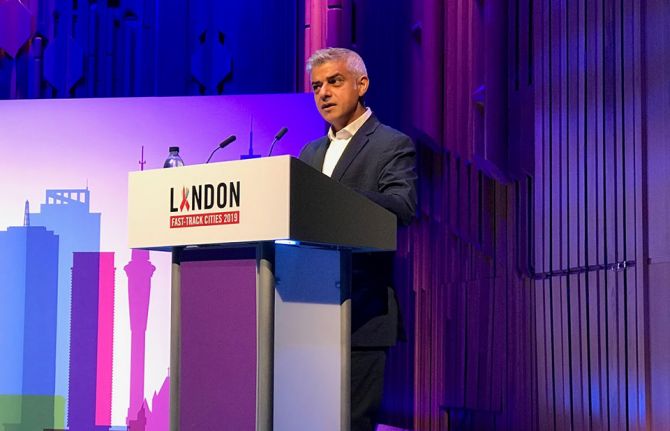
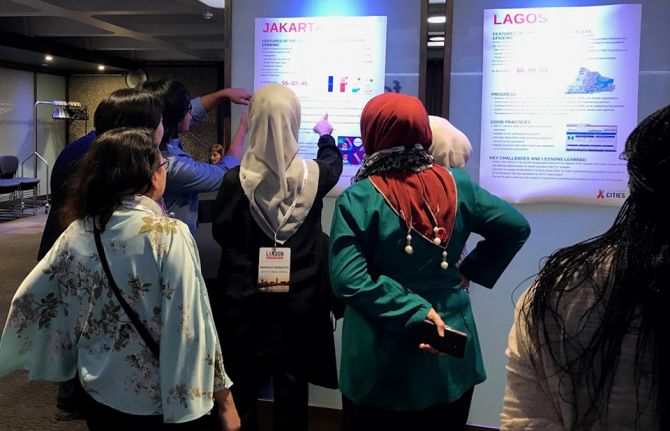
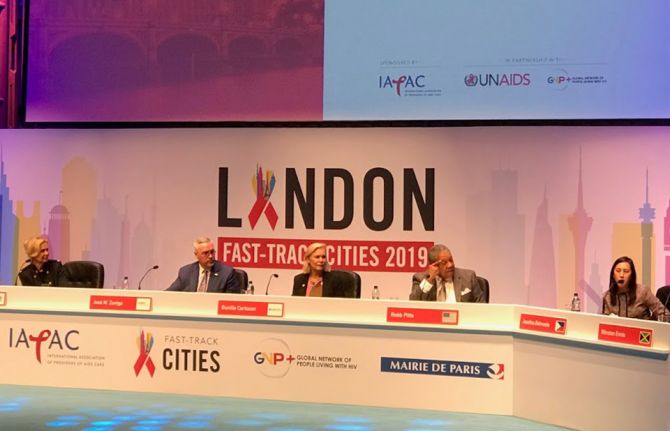
Feature Story
Five years on: 300 Fast-Track cities come together
10 September 2019
10 September 2019 10 September 2019More than 700 delegates from cities around the world have gathered in London, United Kingdom, for the first Fast-Track cities conference. The meeting, hosted by the International Association of Providers of AIDS Care (IAPAC) in partnership with UNAIDS and the Global Network of People Living with HIV (GNP+), is focusing on the efforts and progress that cities have made as well as the challenges and lessons learned over the past five years.
On World AIDS Day 2014, the Fast-Track cities initiative was launched in Paris, France, with 26 cities signing up to the initiative. It has now expanded to more than 300 cities and municipalities.
In a dialogue on the imperative of ending health inequalities in cities, a high-level panel of mayors, governors, civil society organizations, parliamentarians, United Nations agencies and other stakeholders addressed health and social inequalities in cities big and small.
Speaking at the opening of the conference, Sadiq Khan, the Mayor of London, confirmed his commitment to the HIV Fast-Track response in his city, which accounts for 38% of all people living with HIV in the United Kingdom.
“I am proud of what we have achieved, but we need to go further,” Mr Khan said. “I wholeheartedly support the United Kingdom’s bold ambition to get to zero new HIV infections, zero AIDS-related deaths and zero discrimination.”
London was one of the first cities to exceed the 90–90–90 and 95–95–95 targets, with recent figures confirming that 95% of all people living with HIV know their status, 98% of those are on treatment and 97% of people on treatment have suppressed viral loads. He also advocated for making pre-exposure prophylaxis (PrEP) widely available, saying, “No ifs, no buts, PrEP needs to be made available to everyone ... it works.”
In addition to London and Amsterdam, Netherlands, which were the first two cities to reach 90–90–90, two other cities in the United Kingdom, Manchester and Brighton and Hove, have also achieved the 90–90–90 targets. In an analysis of data from 61 cities, it was reported that 14 cities have surpassed the first 90, another 16 cities have surpassed the second 90 and 23 cities have surpassed the third 90.
UNAIDS Executive Director, a.i., Gunilla Carlsson said, “The AIDS response can be a pathfinder for fostering resilience in cities. We need continued inclusive leadership from mayors working hand in hand with communities to address the many structural and social factors that contribute to people being left behind with no access to health services.”
Other cities highlighted examples of how innovation and creating an enabling environment can increase the scale-up of services. In Melbourne, Australia, for example, the response began early with bipartisan political support at all levels of government, galvanizing a partnership between political, community and scientific leaders. This has driven the virtual elimination of mother-to-child transmission of HIV and transmission among sex workers. And in Nairobi, Kenya, the city has reached antiretroviral therapy coverage levels of close to 100% among people who have been diagnosed with HIV. The city credits the success to better data gathering, which helped to identify the needs of key populations and young people living in informal settlements.
IAPAC President and Chief Executive Officer José Zuniga reiterated the importance of cities, where more than 50% of the world’s population live. “The Fast-Track cities calculus for success requires political will and commitment, community engagement, data-driven planning and equity-based approaches so that no one is left behind,” he said.
Fast-Track Cities 2019
Related press release

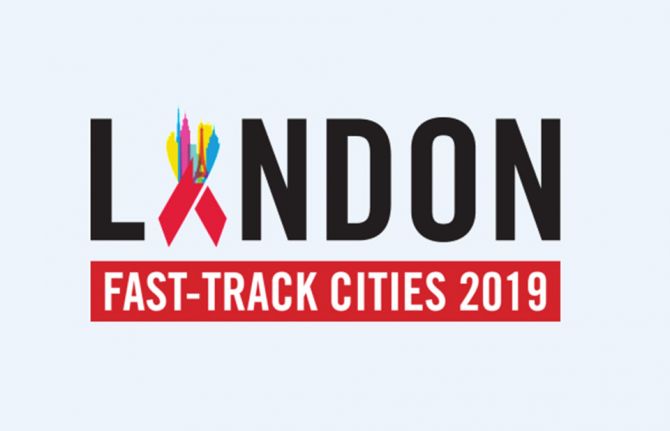
Press Release
Global leaders unite to tackle health inequalities
09 September 2019 09 September 2019Delegates from more than 300 municipalities join global Fast-Track Cities conference on urban HIV, tuberculosis, and viral hepatitis
LONDON, UNITED KINGDOM, 9 September 2019 — London Mayor Sadiq Khan today welcomed city, municipal, and global leaders to Fast-Track Cities 2019, the inaugural conference of more than 300 cities and municipalities prioritizing their responses to urban HIV, tuberculosis (TB), and viral hepatitis. Speaking at the conference, Mayor Khan highlighted the problem of health inequalities across the world, as well as the need to end the stigma still associated with HIV. He also reiterated the bold ambition for London to achieve the target of no new HIV infections, deaths, and stigma by 2030.
“I’m honoured that city and health leaders from all around the world are uniting today in London. The first international gathering of Fast-Track Cities will be a truly historic event in our fight against HIV and health inequalities,” said Mayor Khan. “I’m also proud of the work London is doing to tackle HIV and inequality, and am pleased that we will be able to share our knowledge and experience with others. But despite our progress, there is still much more to be done as too many people continue to catch the virus. To truly end all new cases of HIV in London, it’s high time the Government made PrEP available via the NHS for all those who need it. No ifs, no buts, and no more pilots – we know it works, it stops the spread of infection and saves money in the long run.”
More than half of the world’s population currently lives in urban centers where the risk of contracting HIV, TB, and hepatitis is significantly higher due to urban dynamics such as social behavior, migration, unemployment, and social and economic inequalities. However, cities and municipalities also have inherent advantages and offer important opportunities to accelerate health responses and take transformative action to ensure that equitable access to health services is available to everyone.
“We have seen that for an effective response to HIV it is critical to remove inequalities, power imbalances, marginalization, and discrimination,” said Gunilla Carlsson, Executive Director a.i., of UNAIDS, one of four core partners of the Fast-Track Cities initiative. “Cities must use their advantages to leverage innovation, create social transformation, and build equitable societies that are inclusive, responsive, resilient, and sustainable,” she added.
Organized by the International Association of Providers of AIDS Care (IAPAC), in collaboration with the Joint United Nations Programme on HIV/AIDS (UNAIDS) and other partners, the Fast-Track Cities 2019 conference is being held from September 9-11, 2019, at the Barbican Centre. The conference’s aim is to highlight successes achieved across the Fast-Track Cities network, address cross-cutting challenges faced by local stakeholders, and share best practices in accelerating urban AIDS responses, inclusive of co-infectious diseases such as TB and viral hepatitis. The conference features plenary sessions, panel discussions, and abstract presentations by representatives from more than 300 Fast-Track Cities.
“Health inequalities are preventing people living with HIV, TB, and viral hepatitis, notably from disenfranchised and minority ethnic communities, from accessing the services they need to live longer, healthier lives," said Dr. José M. Zuniga, President/CEO of the International Association of Providers of AIDS Care (IAPAC), one of the core partners of the Fast-Track Cities initiative and the conference’s organizer. “We are convening in London because the city’s high level of political commitment, public health leadership, support from clinical and service providers, and engagement with affected communities have enabled the city to surpass the Fast-Track Cities’ programmatic HIV targets. We are here to shine a light on London’s efforts to reduce and eliminate health inequalities that contravene the principles of social justice.”
When London joined the Fast-Track Cities initiative in January 2018, the city had already met the UNAIDS 90-90-90 targets, which are defined as 90% of people living with HIV knowing their status, 90% of people who know their status accessing HIV treatment, and 90% of people accessing HIV treatment achieving viral suppression. FTC London, a pan-city group of stakeholders steering the city’s Fast-Track Cities engagement, has made outreach to the black, Asian, and minority ethnic (BAME) community a priority in their “London Getting to Zero” strategy.
The “High-Level Panel on Health Inequalities,” which was the official opening of the Fast-Track Cities 2019 conference, included the following elected officials:
- Kostas Bakoyannis (Mayor, Athens, Greece)
- Josefina Belmonte (Mayor, Quezon City, Philippines)
- Winston Ennis (Deputy Mayor, Kingston, Jamaica)
- Simone Kukenheim (Deputy Mayor, Amsterdam, Netherlands)
- Fernando Medina (Mayor, Lisbon, Portugal)
- Svante Myrick (Mayor, Ithaca, NY, USA)
- Robb Pitts (Chairman, Fulton County, Atlanta, GA, USA)
- Mykola Povoroznyk, (First Deputy Mayor, Kyiv, Ukraine)
- Gennadiy Trukhanov (Mayor, Odesa, Ukraine)
In addition to IAPAC’s Dr. Zuniga, and UNAIDS’ Ms. Carlsson, several global public health leaders also participated in the “High Level Panel on Health Inequalities,” including:
- Amb. Deborah L. Birx (US Global AIDS Coordinator, PEPFAR)
- Cary James (CEO, World Hepatitis Alliance)
- Suvanand Sahu (Deputy Executive Director, Stop TB Partnership)
- Maimunah Mohd Sharif (Executive Director, UN-Habitat)
- Trevor Stratton (Board Member, GNP+)
- Marijke Wijnroks (Chief of Staff, Global Fund to fight AIDS, TB and Malaria)
The panel was moderated by UK-based broadcaster and former BBC journalist Henry Bonsu.
Press passes for Fast-Track Cities 2019 are available by contacting IAPAC Director of Communications Zack Pesavento at zpesavento@iapac.org.
The conference program is available at: https://www.iapac.org/conferences/fast-track-cities/#program
About the International Association of Providers of AIDS Care (IAPAC)
With more than 30,000 members globally, IAPAC is the largest association of clinicians and allied health professionals working to end AIDS as a public health threat by 2030. For more information about IAPAC and our global activities, please visit: https://www.iapac.org/
About the Fast-Track Cities Initiative
Fast-Track Cities is a global partnership between almost 300 cities and municipalities, the International Association of Providers of AIDS Care (IAPAC), the Joint United Nations Programme on HIV/AIDS (UNAIDS), the United Nations Human Settlements Programme (UN-Habitat), and the City of Paris that are collaborating to end the epidemics of HIV, TB, and viral hepatitis by 2030. The initiative was launched on World AIDS Day 2014 in Paris. For more information please visit: https://www.iapac.org/fast-track-cities/about-fast-track/
UNAIDS
The Joint United Nations Programme on HIV/AIDS (UNAIDS) leads and inspires the world to achieve its shared vision of zero new HIV infections, zero discrimination and zero AIDS-related deaths. UNAIDS unites the efforts of 11 UN organizations—UNHCR, UNICEF, WFP, UNDP, UNFPA, UNODC, UN Women, ILO, UNESCO, WHO and the World Bank—and works closely with global and national partners towards ending the AIDS epidemic by 2030 as part of the Sustainable Development Goals. Learn more at unaids.org and connect with us on Facebook, Twitter, Instagram and YouTube.

Feature Story
Osh signs the Paris Declaration
22 August 2019
22 August 2019 22 August 2019Osh, Kyrgyzstan, has become the latest city to sign the Paris Declaration to end the AIDS epidemic in cities, becoming the second city in the country to commit to reaching the 90–90–90 targets by the end of 2020.
“We sign this declaration because we realize that large cities are the engine of HIV,” said Kadyrov Nurbek Suyunbaevich, Deputy Mayor of Osh. “Thanks to effective HIV testing and treatment, we can control the epidemic and people can live a healthy and fulfilling life. The city of Osh is taking steps to end AIDS and we are already allocating funds for HIV prevention.”
“UNAIDS is pleased that Osh has become a Fast-Track city. By signing the Paris Declaration, Osh will also strengthen health systems in the city,” said Meerim Sarybaeva, the UNAIDS Country Manager in Kyrgyzstan.
Osh is one of the oldest cities in central Asia, with a population of almost 300 000 people. It was one of the first places in central Asia to be affected by HIV, owing to the drug trafficking routes that passed through the city. From 2005 to 2007, there was a severe outbreak of nosocomial HIV infections among children in the city. According to government statistics, there are more than 1100 people living with HIV in Osh.
Osh implemented some of the first HIV prevention programs in Kyrgyzstan. The city has expanded its HIV rapid testing programme for people at higher risk of HIV, launched a treatment adherence programme for people living with HIV based on mobile technology and is scaling-up the coverage of opioid substitution therapy.
“This is an important political step, which requires that we mobilize the necessary resources, both human and financial, to ensure effective HIV prevention programmes for all key populations,” said Aybar Sultangaziev, Director of the Partnership Network Association
Since the launch of the Fast-Track cities initiative on 1 December 2014, more than 350 cities and municipalities around the world have signed the Paris Declaration. The declaration offers cities not only tools to end AIDS but also a platform to address social inclusion and public health.

